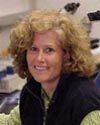By Karyn Houston

An expert scientist in cell specialization at UC Berkeley has been awarded a prestigious Miller Fellowship to further her research in the cost-effective production of biofuels.
N. Louise Glass, of the Department of Plant & Microbial Biology, will use the award to initiate a new focus for the Glass lab that utilizes the lab’s experimental data and knowledge base to make further discoveries about plant cells and biofuel production.
In collaboration with a colleague at the University of Illinois Urbana-Champaign, Dr. Nathan Price, Glass will focus on developing tools to accelerate the use of plant biomass for biofuel production using a model organism for this process (the filamentous fungus Neurospora crassa). Currently, the cost of producing enzymes from fungi that degrade plant cell biomass is a limiting factor in the development of marketable lignocellulosic biofuels.
This proposal is unique because it brings together the expertise of a fungal biologist (Glass) and a computational biologist (Price). In addition, they will be collaborating with colleagues in Seattle and Australia to significantly enrich the depth and understanding of the metabolic-regulatory network of plant cell wall deconstruction by Neurospora. Understanding how plant cell biomass is deconstructed will be essential for manipulation of these pathways in an industrial setting, and will be critical to achieving the goal of making biofuel production economically and logistically feasible.
The award will enable Prof. Glass to take a break from teaching and administrative duties at UC Berkeley for 6 months during the 2011-12 academic year to focus exclusively on this project.
Prof. Glass and her colleagues are heavily involved in research with EBI — the Energy Biosciences Institute - funded by UC Berkeley and British Petroleum in a unique joint venture. The Glass Lab utilizes a combination of molecular biology, genetics, cell biology, genomics and bioinformatics to investigate plant cell wall deconstruction. Glass also investigates other aspects of fungal biology, including cell specialization, communication and non-self recognition — all crucial signaling mechanisms in microbial organisms such as filamentous fungi.
Glass Lab
Plant & Microbial Biology, UC Berkeley
The Adolph C. and Mary Sprague Miller Institute for Basic Research in Science was established in 1943 to encourage “creative thought and conduct of research and investigation in the field of pure science.” The first appointments to the Miller Institute were awarded in January 1957, upon the deaths of both Dr. and Mrs. Miller.
Dr. Miller was a native San Franciscan and University of California alumnus. He served on the UC Berkeley faculty for eleven years, including as Flood Professor of Economics and Commerce, where he helped to develop the newly established College of Commerce, the forerunner to the present Haas School of Business. Miller went on to become the United States Assistant Secretary to the Interior, and later served on the Board of Governors for the Federal Reserve System, a position he held for 22 years.
The Miller Institute annually funds Fellowships, Senior Fellowships, Research Professorships and Visiting Professorships, and an interdisciplinary symposium.
